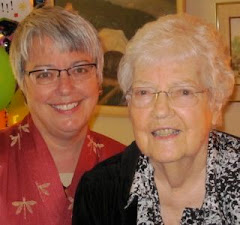Mom had a spot on her forehead that has bothered her over the past year. Her fingers constantly fly up to rub it. It is barely visible, and it didn't seem to be hurting anything, so I was mildly irritated by her obsession with this bump. It seemed silly and vain to me, to be honest, kind of like her urgency to keep a stock of depilatory to remove her (barely visible) upper-lip hairs.
Still, I took her to her regular doctor - twice. He used a substance to try to freeze it off - twice. Each time it came back. The third time he referred us to a dermatologist. I admit I still felt it was just not that big of a deal, though I saw that it had grown quite a bit, so I arranged my schedule to get her to another doctor visit.
After a biopsy, it came back as Squamous Cell Carcinoma In Situ. In the photo below, the one with the circle was the target of the biopsy. The other larger one remains.
The question now became ... what's next? What treatment will we choose? She is 91, on hospice for congestive heart failure, but she could survive for a few more years. What to do?
The dermatologist prescribed a course of Aldara, a cream chemotherapy. After reading about it, I became convinced she would not tolerate the pain, itching, bleeding, and other awful side effects. In talking to the doctor, we learned that the options are:
- treat aggressively with Aldara and suffer the side effects (though the doctor said they are 'not that bad')
- treat less aggressively with Aldara and suffer fewer side effects, possibly slowing any growth
- treat it surgically (to slow it down), but that would likely require a skin graft
- not treat it, knowing that any resultant possible spread of this 'very slow growing' and 'surface' cancer would take more years than she likely has remaining in her life.
She chose Door #4, not treating it, and I fully support that choice.
This was a very sobering consideration, reminding us of the quality of life vs quantity of life. We talked again about her choice being on hospice, choosing not to use life-extending measures.
So, returning to our friend Mr Shakespeare, we read on:
To be, or not to be, that is the question:
Whether 'tis nobler in the mind to suffer
The slings and arrows of outrageous fortune,
Or to take arms against a sea of troubles,
And by opposing end them? To die, to sleep,
No more; and by a sleep to say we end
The heart-ache, and the thousand natural shocks
That flesh is heir to: 'tis a consummation
Devoutly to be wished. To die, to sleep;
To sleep, perchance to dream – ay, there's the rub:
For in that sleep of death what dreams may come,
When we have shuffled off this mortal coil,
Must give us pause – there's the respect
That makes calamity of so long life.
For who would bear the whips and scorns of time,
The oppressor's wrong, the proud man's contumely,
The pangs of disprized love, the law’s delay,
The insolence of office, and the spurns
That patient merit of the unworthy takes,
When he himself might his quietus make
With a bare bodkin? Who would fardels bear,
To grunt and sweat under a weary life,
But that the dread of something after death,
The undiscovered country from whose bourn
No traveller returns, puzzles the will,
And makes us rather bear those ills we have
Than fly to others that we know not of?
Thus conscience does make cowards of us all,
And thus the native hue of resolution
Is sicklied o'er with the pale cast of thought,
And enterprises of great pith and moment,
With this regard their currents turn awry,
And lose the name of action. Soft you now,
The fair Ophelia! Nymph, in thy orisons
Be all my sins remembered.




